FARMINGDALE, N.Y. — Two years ago in Rome, and two years before that in Whistling Straits, we justified running our Ryder Cup report card on Saturday, rather than after the event concluded Sunday, by saying that “the match is tipping toward a conclusion before anyone hits a shot in Sunday singles.”
Well, folks, here we are again! Another Ryder Cup, another disappointing blowout with a total dearth of drama awaiting on Sunday. The only difference is that for the first time in a decade, it’s the away team dealing the heavy blows, with Europe leading by five(!) points heading into the singles session. But this isn’t the place for complaining that the event is competitively dead; this is the place to hand out grades for all 24 players.
We’ll start with Europe, going in alphabetical order, with a shout out to Data Golf for the strokes gained statistics.
EUROPE Ludvig Aberg (1-2-0): D
You’d never have guessed his grade would be this bad after Friday morning, when he and Matt Fitzpatrick dominated over World No. 1 Scottie Scheffler and Russell Henley. In reality, that was down to Fitzpatrick’s astonishing play, with Aberg hitting some big putts but working mostly in a supporting role. It got worse from there, with a blowout loss in Friday fourballs and another in Saturday morning foursomes, where Aberg was the worst player on the course by strokes gained. By those same numbers, he was the worst European for the entire event.
Matt Fitzpatrick (2-1-0): A-
Two wins, including an incredibly clutch shot in the final match on Saturday night to secure Europe’s last point (putting them definitively out of American comeback range), means Fitzpatrick had a stellar Ryder Cup. He was a top-five player by strokes gained, and almost more importantly, his game was located somewhere on the moon in the first foursomes session, where he was, by far, the best player on the course. Competent play in his last two matches yielded another point, and even though I’m dinging him slightly for losing Saturday morning, we should note that he was partnered with Aberg, who, as mentioned above, let him down. This was a big weekend for a guy who came in with a 1-7 record.
Tommy Fleetwood (4-0-0): A++++++++++++++ 
Vaughn Ridley
I don’t even know what to say here, because the superlatives don’t exist. Was he the best player by strokes gained, by far? Yes. Was he the only player who went 4-0? Yes. Is he a golden Ryder Cup god who should have a statue of himself built in every town in England? Probably, yeah. But none of that gets at what it feels like to watch him, when he sticks almost every iron devastatingly close and buries long putts on the few occasions when he leaves himself more than five feet. Even the man’s body language with his teammates is beyond reproach; he looks like the best guy in the world to pair with, and along with stellar play, he brings so much positive energy to the team. He’s a superstar, and he deserves more pluses after the “A” grade than I gave him.
Tyrrell Hatton (3-0-0): A-
Hatton was good, don’t get me wrong, but statistically he was pretty much dead average among these 24 players. Like Fitzpatrick, his Saturday afternoon partner after filling in for an injured Viktor Hovland, he was at his best Friday morning, when he came out blazing as the super-team of him and Rahm got the first win. He dropped off a little Saturday morning, but had his big moments, and then on Saturday he fought valiantly through the tense final match to help Europe get to 11½. What distinguished Hatton was his putting, which dealt blow after blow to the Americans as he finished fourth among all players in SG: putting.
Rasmus Hojgaard (0-1-0): C-
You can chalk a tough rookie campaign up to a little bad luck for Hojgaard, whose Ryder Cup debut came against a red-hot pairing of Justin Thomas and Cameron Young in Friday fourballs, and ended in a 6-and-5 drubbing. He didn’t play again, and probably for good reason—his strokes-gained numbers were poor, as were his partner Aberg’s, and it was a lamb-to-the-slaughter situation. When Saturday afternoon came around, the Europeans were so close to clinching an insurmountable margin that Donald clearly decided it wasn’t worth trying him out again. He’ll have another shot in singles to try to make something good of his rookie campaign.
More Ryder Cup coverage 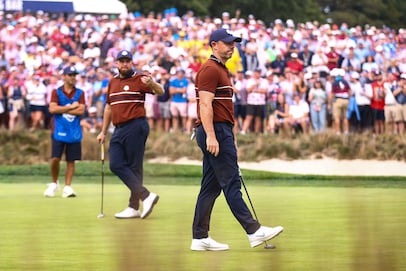 News Ryder Cup 2025: Walking with Rory McIlroy amid the shower of F-bombs and abuse as Bethpage crowd crosses a line
News Ryder Cup 2025: Walking with Rory McIlroy amid the shower of F-bombs and abuse as Bethpage crowd crosses a line 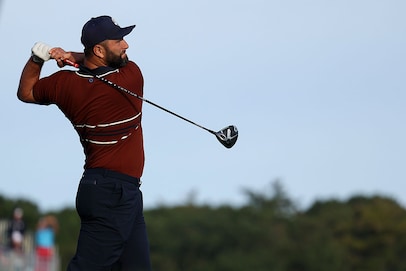 Instruction Ryder Cup 2025: Jon Rahm has mastered one of Seve’s key match play principles
Instruction Ryder Cup 2025: Jon Rahm has mastered one of Seve’s key match play principles 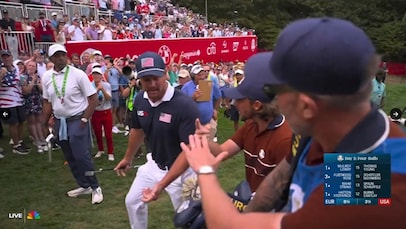 Ryder Cup 2025 Ryder Cup 2025: Explaining the heated argument between Euros, caddies and Bryson DeChambeau Viktor Hovland (1-1-0): B-
Ryder Cup 2025 Ryder Cup 2025: Explaining the heated argument between Euros, caddies and Bryson DeChambeau Viktor Hovland (1-1-0): B-
Hovland struggled mightily in Friday morning foursomes, ending up as part of the only European pairing to lose in the session, and he wasn’t exactly scintillating in his other match Saturday. Still, he more than made up for all that with an incredible putt on 17 that kept the Europeans 1 up on Scheffler and Henley and led to a victory that gave the road team a five-point lead heading into the afternoon. We try to judge these grades holistically rather than by a single moment, but when the moment is that big, it merits elevating the overall mark. Meanwhile, Hovland was scratched from his final match Saturday afternoon due to injury, and it remains to be seen if he’ll play Sunday.
RELATED: Viktor Hovland’s status for Sunday singles in doubt after injury
Shane Lowry (1-0-1): B- 
Jared C. Tilton
I swear Lowry lives the most charmed life in Ryder Cup history. The last two years, it’s been the same: He plays mostly sub-mediocre golf, but he manages to win every match because his partner is electric, and at some point he also hits a big shot or a big putt to mask his otherwise iffy performance. Bethpage went just like Rome, where he comes away with 1½ points in two matches, and you have to give him credit for clutch play on 17 and 18 Saturday afternoon with Rory in an extremely hostile environment. Still—still—the guy was the fourth-worst player statistically of any player. He’s going to leave this Ryder Cup yet again with a solid reputation, and for that he’s the luckiest man in Europe.
Robert MacIntyre (1-1-0): B
I’m tagging him with a slightly better score than his foursomes partner Hovland, even though MacIntyre played objectively better, finishing with strokes gained almost exactly at the event average. While he never had a moment quite like Hovland’s putt on 17 Saturday morning, though, he was steady, giving his team a chance to win both matches. It didn’t work out on Friday, but not for lack of trying—two dart approaches on 12 and 13 got his team to within one before the loss. He got his win on Saturday thanks in part to an approach on 14 that landed inside six feet, and led to the 1-up lead they’d hold for the rest of the match.
Rory McIlroy (3-0-1): A+ 
Carl Recine
It’s not just that he played well; it’s that he played well as the No. 1 target of the worst American fans, a small but vocal set who disgraced themselves with an endless stream of personal insults directed at McIlroy in all four sessions he played. The amount of strain he’s subjected to is almost unworldly, and he usually manages to thrive in spite of it. Even after the worst of those matches finished on Saturday afternoon, he didn’t take the chance to indict the fans. We should add here that Rory called his shot in Rome, predicting after that Cup that they’d win at Bethpage, and delivered with three wins and a tie over the first two days. By the numbers, he was only the fifth-best European at Bethpage, but his resilience and the massive putts he hit merits this A+.
Jon Rahm (3-1-0): A
Here’s how good Rahm was: It feels incredibly stingy to give him a mere “A” instead of an “A+.” There has to be some penalty for losing his final match, but even that came down to the last hole, and Rahm’s aura is so enormous that when he had to chip in from the bunker to have a shot at a half point, I gave him a roughly 60 percent chance of pulling it off. He was the third-best player by strokes gained, the second-best putter, and the best around the greens. And in the first two sessions, when it mattered most, Luke Donald put him out first as the flagbearer. He delivered both times—of course he did—and he cemented and somehow enhanced his already stellar Ryder Cup legacy.
Justin Rose (2-0-0): A 
Harry How
Just like in Rome, Donald called on the 45-year-old Rose to fill a very specific role: Play two fourball matches. Granted, his assignment this time was a good degree easier, partnering with Tommy Fleetwood instead of a struggling Robert MacIntyre, but he was just as ready for the challenge. How did it go? Well, the man dropped every putt in sight, including the winning putt Saturday night to stretch Europe’s lead to five points—a margin that has never been surmounted on Sunday. Let’s put the putting into statistical context: Jon Rahm was the second-best putter on any team by strokes gained, with +1.76 gained on the field for the whole event. Rose gained +4.88 strokes putting. Read that last sentence again, remember that he’s 45 years old, and let yourself melt in awe.
Sepp Straka (1-1-0): C-
For the most part, Straka did not deliver, despite winning a point on Friday afternoon, and he finished his pairs campaign by doing the seemingly impossible: losing a match with Jon Rahm on your team. That may sound harsh for a guy who went 1-1, but by strokes gained he was the second-worst European and the third-worst player overall, which—this is more harsh—lines up with him not making the cut at three majors this year. He did come away with a point, but he wasn’t especially solid.
More Ryder Cup coverage  Super Teams Ryder Cup 2025: Forget U.S. woes, Europe is playing historically good
Super Teams Ryder Cup 2025: Forget U.S. woes, Europe is playing historically good  Ryder Cup Ryder Cup 2025: Rory McIlroy had the perfect response when asked if the crowd took it too far on Saturday
Ryder Cup Ryder Cup 2025: Rory McIlroy had the perfect response when asked if the crowd took it too far on Saturday 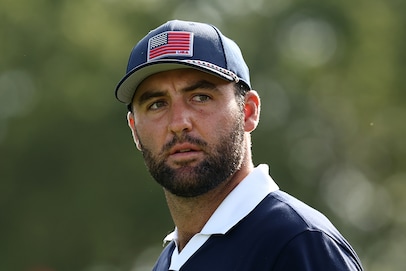 Ryder Cup Ryder Cup 2025: Scottie Scheffler made the wrong type of history at Bethpage Black UNITED STATES Sam Burns (0-2-0): F
Ryder Cup Ryder Cup 2025: Scottie Scheffler made the wrong type of history at Bethpage Black UNITED STATES Sam Burns (0-2-0): F
You don’t have to be a mathematician to understand when you play two sessions and are the worst player by strokes gained in both of them, you will also be the worst player by strokes gained in the entire Ryder Cup. Burns, sometimes thought of as the last captain’s pick, laid a complete egg for Bradley, and it was almost poetic that he was the last man on the stage Saturday night, missing a point to tie the anchor match. Ironically, he did get a half point on Friday night, but that was almost entirely down to Cantlay, who played well enough both Friday and Saturday afternoon, but had very little support from his partner.
Patrick Cantlay (1-2-1): C+
The stats and the record say Cantlay was mediocre, with 1½ points in four starts, but he was even worse than that in light of his team match-play history, where he’s become known for burying dagger putts in clutch situations. He showed a little bit of that old form late on Saturday, making his birdie on 17 to avoid going 1 down, but there just wasn’t enough of it. Throw in some woeful approach shots on 18 under pressure, and it was a disappointing Cup for Cantlay. Yes, he was hurt by partnering with Burns twice, but he didn’t do much to help his cause, and the Americans needed more from one of their veteran stalwarts.
Bryson DeChambeau (1-3): B+ 
Harry How
How can someone who went 1-3 get a B+? Well, simply put, DeChambeau was really good for most of the Ryder Cup. On Friday, he was absolutely cursed by his partners, drawing the worst player on the course Friday morning in Justin Thomas, and the second-worst in the afternoon in Ben Griffin. He and Cam Young thrived in his lone win in Saturday foursomes, but then Young let him down in the afternoon in another loss. DeChambeau ended as the second-best American after Young, he brought the energy constantly, and the only real critique you can give is that he missed some key putts down the stretch Saturday afternoon. I can’t give him an A- just because he did go 1-3, but he can take pride in how he played.
Harris English (0-2-0): D-
I have a lot of trouble treating English too harshly here, for the simple fact that Bradley put him in literally the worst pairing possible from a statistical angle, twice, and both times he had to face Fleetwood and McIlroy. In other words, he was put in a position to lose, and that’s exactly what he did, badly. But facts are facts—even if Bradley let him down, he finished with the third-worst strokes gained of any player on either team.
Ben Griffin (0-1-0): D
Incredibly tough scenes for Griffin, the only American (and the only player overall besides Rasmus Hojgaard) who got just one start in the first four sessions. It wasn’t a good match, either, as you might expect; he played with Bryson DeChambeau, Bryson was great, but Griffin let him down enough that they lost 1 down to Fleetwood and Rose in a critical match. He started playing a little better late in the match, which is why his grade isn’t worse, but he finished with the second-worst strokes gained of the session and clearly inspired no faith from a captain who wouldn’t play him again.
Russell Henley (0-2-0): C-
Henley was supposed to be the answer to the question of, “Who do you pair with Scottie Scheffler?” after the Scheffler-Burns pairing crashed and burned over and over. They looked good together in Montreal, but here it was a dismal showing. Henley was rough from the first tee shot on Friday morning, and while he was better on Saturday morning—partly because Bradley started him off the correct tees this time—it still wasn’t enough to help the World No. 1 get over the finish line. Scheffler was average by his standards in both sessions, but Henley let him down.
Collin Morikawa (0-2-0): C- 
Carl Recine
See Harris English above—Morikawa was screwed over by an unbelievably poor captain’s decision and ran into a European juggernaut pairing twice on the way to two bad losses. He was slightly better than English from a statistical angle, hence the slightly better grade, but still struggled to get anything going beyond a few strong iron shots. Morikawa was a weapon in his first Ryder Cup at Whistling Straits, but it’s been nothing but struggle ever since.
Xander Schauffele (2-1-0): B-
After Schauffele got the opening with Cantlay, it felt like the start of another strong Ryder Cup campaign, and it may end that way, too—he’s 2-1, and a singles victory would leave him at 3-1, which is great by any standard. And yet, he never seemed to play like the Xander of old, particularly on Saturday morning when he was the second-worst player on the course, or to make a big putt, even as he grinded out his two wins. Despite the impressive late win over Rahm and Straka, it was J.J. Spaun doing the heavy lifting. This was a fine performance, and points are points, but Xander’s performance was a little like his 2025 in general—not up to a previous standard.
Scottie Scheffler (0-4-0): C 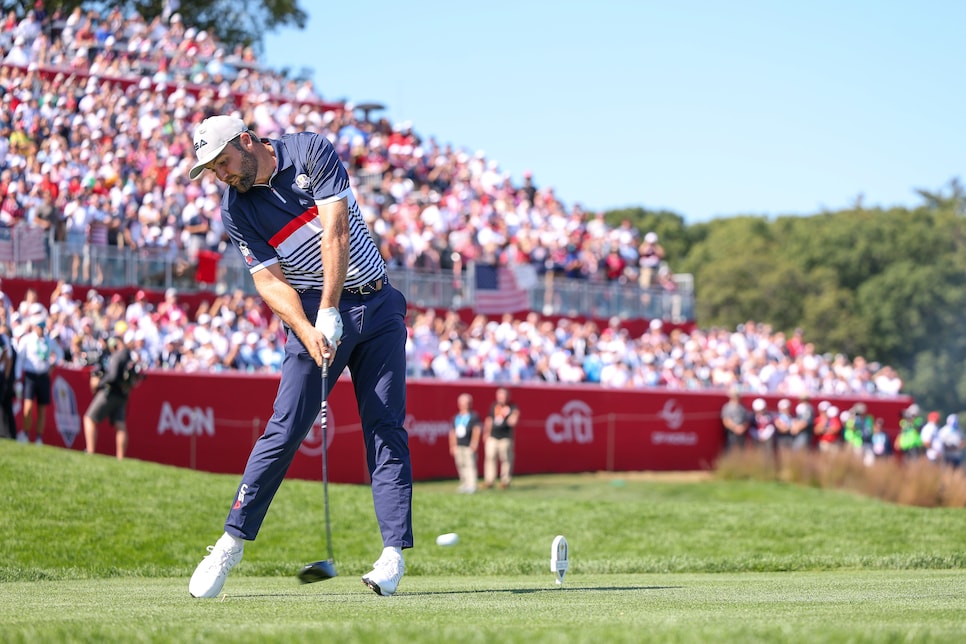
Andrew Redington
I wrote a mildly critical piece on Scheffler on Friday, and I still think it’s incredible that the Americans have spent three decades unable to figure out how to get wins with a generational player (between him and Tiger). However, when the dust settled, the total strokes gained had him as the third-best American, and the eight-best player overall. Again, not at all up to his standard, but not as terrible as the winless record would have you believe. So what gives? Well, small sample size and variance—sometimes his partners let him down, and when they didn’t, as in his Saturday afternoon with DeChambeau, they ran into juggernauts in Rose and Fleetwood, neither of whom seemed capable of missing a putt. So I’m cutting him some slack. Make no mistake, though, a guy this good going 0-4 is both embarrassing and a little sad.
J.J. Spaun (1-1-0): B+
I was excited this week to see Spaun play, after getting a sense of him as a strong pressure player both at the Players, where he fell just short of winning, and at the Oakmont U.S. Open, where he became a major champion on an impossible track. In his first match with Scheffler on Friday afternoon, he was so-so, but late on Saturday afternoon he showed what he was made of with a dynamic finish to his match and a frankly pretty surprising win over Jon Rahm. It feels at this moment like Bradley screwed up by not using him more, because the Spaun we saw late in the day felt like a massive Ryder Cup asset, and his brilliant pressure play was one of the few bright spots for the U.S.
Justin Thomas (1-2-0): C+
What a puzzling Ryder Cup so far for Thomas. On Friday afternoon, he teamed with Cam Young to put together the best match the U.S. saw over two days, and a 6-and-5 victory. But earlier that morning, paired with Bryson DeChambeau, he was the worst player statistically on the course, and he wasn’t so hot Saturday afternoon in a painful late loss to McIlroy and Lowry when teamed with Young again. Thomas has been one of the most reliable Ryder Cup and Presidents Cup players of his generation for the U.S., but here he only showed that brilliance very briefly. It was a hell of a high point, but the rest was a letdown.
Cameron Young (2-1): A- 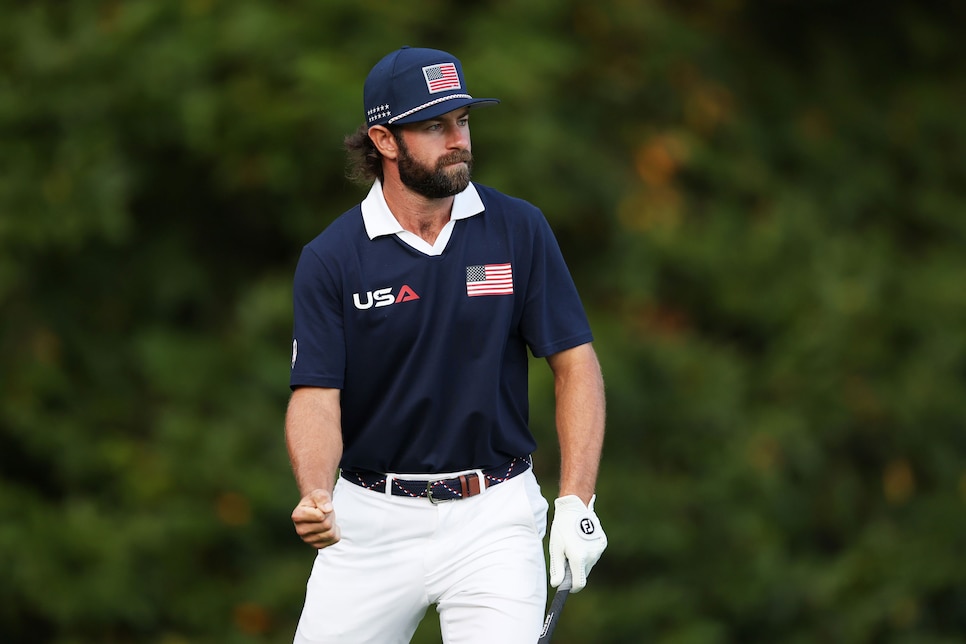
Richard Heathcote
Young is one of only two Americans with two points, and he ended as the top American statistically too, gaining 4.28 strokes. There was theoretically the most pressure on him, being the only native New Yorker on the team, but he rose to the occasion marvelously and more than rewarded Keegan Bradley’s faith in him as a captain’s pick. Even as the U.S. team went down in flames, he was the bright spot (read here for my full thoughts on Young’s performance), and though I have to ding him for a less-than-stellar Saturday afternoon session, overall he gets great marks in his rookie Ryder Cup.
More Ryder Cup coverage 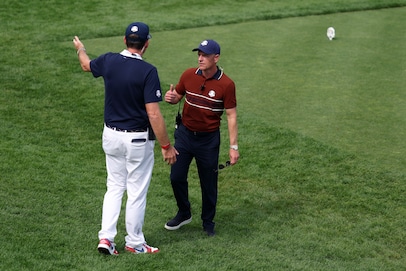 Rules Ryder Cup 2025: Why Viktor Hovland’s injury could lead to this obscure rule being used for the first time in three decades
Rules Ryder Cup 2025: Why Viktor Hovland’s injury could lead to this obscure rule being used for the first time in three decades 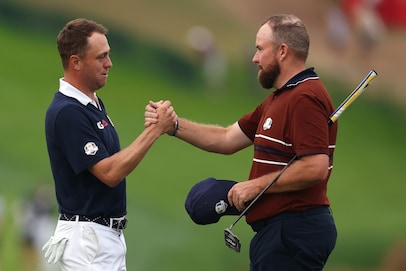 Ryder Cup 2025 Ryder Cup 2025: Justin Thomas had a decision to make. He chose class
Ryder Cup 2025 Ryder Cup 2025: Justin Thomas had a decision to make. He chose class 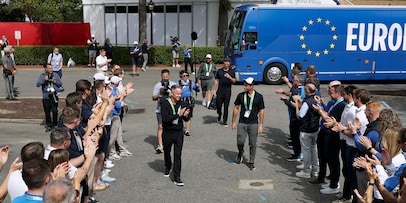 Europe’s 14th Man Ryder Cup 2025: The subtle way Europe has cracked the code to motivating its players
Europe’s 14th Man Ryder Cup 2025: The subtle way Europe has cracked the code to motivating its players
This article was originally published on golfdigest.com




